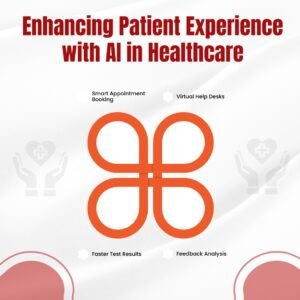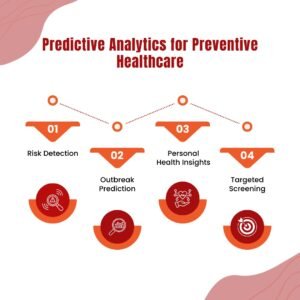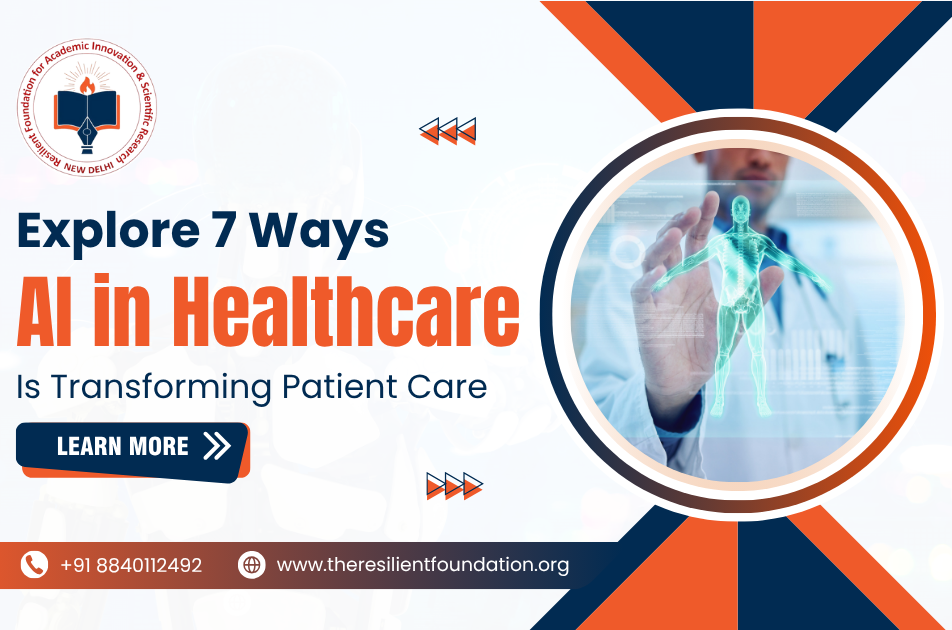Healthcare is becoming better and faster, and AI in healthcare is a big reason for that. It helps doctors, nurses, and hospitals take better care of patients. With the help of artificial intelligence, things are now more accurate and quicker. Patients get help on time, and doctors can make better decisions. At Resilient Foundation, we support this change. That’s why we run online workshops and training programs to teach people how to use these new tools to make patient care better. Our goal is to make sure everyone can learn and use AI in real life.
Enhancing Patient Experience with AI in Healthcare
AI is making the whole patient journey easier and smoother. Firstly, here’s how:

- Smart Appointment Booking: People can now book doctor visits quickly using AI tools. It saves time and is simple to use.
- Virtual Help Desks: Chatbots give answers to questions anytime, even at night. They work 24/7 to help patients.
- Faster Test Results: AI checks test reports fast. So, patients do not have to wait too long to know their results.
- Feedback Analysis: Hospitals use AI to read patient reviews. It helps them improve their services.
These changes are because of AI in healthcare. At Resilient Foundation, our online workshops and training programs help people learn all these step-by-step.
AI in Remote Patient Monitoring
Some patients stay at home but still need care. AI in healthcare helps doctors monitor their health from afar. Smart devices check things like heart rate, sugar, oxygen, and blood pressure. These devices send the data to doctors. If something goes wrong, the doctor gets a message quickly. This helps save time and can stop big health problems before they happen. We teach this topic in our online workshops, and we explain how it links to biomedical science.
Predictive Analytics for Preventive Healthcare
AI can also help stop sickness before it starts. For example, here are a few ways:

- Risk Detection: AI checks health records to find out who may get sick in the future; consequently, it helps in identifying potential health risks.
- Outbreak Prediction: It looks at reports and, consequently, says where a disease may spread soon.
- Personal Health Insights: AI apps give health tips to people based on their daily habits.
- Targeted Screening: AI shows which people need tests the most, so doctors can focus on them.
AI in healthcare is helping people stay safe and healthy. At Resilient Foundation, we teach this in our training programs so more people can help others using these smart ideas.
Faster and More Accurate Diagnoses
Sometimes doctors take time to find the right sickness. But now, AI in healthcare helps doctors know faster. It checks X-rays, blood tests, and other reports in just a few seconds. AI can also see very small signs of disease that people may miss. This saves time and helps give the right treatment. At Resilient Foundation, we show how this works through our online workshops. This is useful for people who want to learn more about biomedical science.
AI in Drug Discovery and Development
Making new medicine is a slow and costly process. AI is helping to make it faster and smarter.
- Target Finding: AI finds the right part of the body where the medicine should work.
- Testing Predictions: AI, therefore, guesses if a drug will work well before it is tested on people.
- Speed Up Trials: AI helps choose good people for testing, so trials go faster.
AI in healthcare is changing how we find new medicines. At Resilient Foundation, we teach this in our training programs, along with ideas from research and development.
Virtual Health Assistants and Chatbots
These are smart tools that talk with patients. Furthermore, they give answers to health questions, tell when to take medicine, and book doctor visits. In addition, they work every day and night. As a result, even when the hospital is closed, patients get help. Ultimately, AI in healthcare gives people peace of mind and quick support. For this reason, at Resilient Foundation, we explain how these tools work in our online workshops and how they can help more people, even in small towns.
Personalized Treatment Plans
Not all treatments work the same for everyone; however, AI helps doctors make plans that fit each person effectively.
- Patient History Review: AI looks at past health problems to find the best treatment.
- Data-Driven Choices: AI, therefore, picks the best option by checking many details and, in addition, numbers.
- Genetic Insights: It can even check genes to see how, consequently, a body will react to medicine.
- Ongoing Adjustments: If the treatment is not working well, then AI, consequently, changes the plan.
Conclusion
AI in healthcare is making big changes in how people get help. It makes things faster, easier, and more personal. At Resilient Foundation, we want more people to learn these new skills. Our online workshops and training programs teach everything. Anyone who wants to work in biomedical science or help in research and development can join us. We also give e certificates after learning. If you want to help others and grow your career, this is the right place for you. Let’s learn together and build a healthier world.

